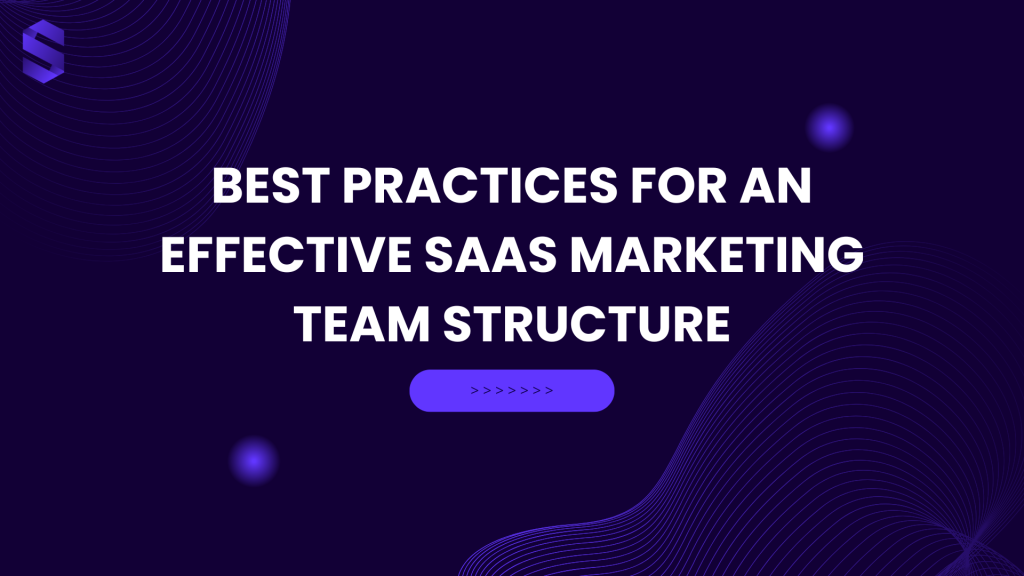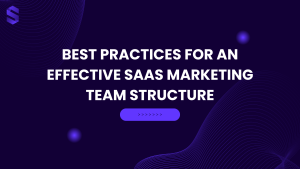Understanding the right SaaS marketing team structure, including a brand marketing team, is key to driving growth. This article will outline the essential roles, how to structure your team based on company size, and best practices for building an efficient team.
Key Takeaways
- A successful SaaS marketing team includes distinct roles in product, growth, content, and brand marketing to effectively drive business goals, as seen in successful SaaS marketing teams.
- Team structure should adapt based on company size and stage, with startups requiring generalists and larger organizations needing specialized roles.
- Agile methodologies and cross-functional collaboration are essential for a responsive marketing team, leveraging data and technology to optimize strategies.
Understanding the Core Components of a SaaS Marketing Team
The strength of a SaaS marketing team is critical for the triumph of any SaaS enterprise. Ensuring that the team encompasses a range of roles guarantees extensive measures toward achieving business objectives. The effectiveness and diversity within a SaaS marketing group are essential to its success, as it needs to address all aspects of marketing competently.
Roles commonly found in an effective SaaS marketing team include:
- Brand Marketing
- Content Marketing
- Product Marketing
- Growth Marketing
Concentrating on these key areas equips the team with a holistic approach towards crafting strategies that not only spur demand but also foster customer bonds and escalate income streams for the business.
Product Marketing
Product marketing is the cornerstone of any SaaS marketing team. This role ensures potential customers are aware of the product’s capabilities and features. Product marketers use both quantitative and qualitative data to influence decisions related to product positioning and messaging, translating product features into clear value propositions.
A successful product marketing strategy involves understanding the target audience and competitive landscape, allowing brand marketers to translate product capabilities into tangible benefits for various market segments.
When hiring for this role, a background in a SaaS company is beneficial to navigate industry-specific challenges.
Growth Marketing
The marketing department dedicated to growth employs a strategy aimed at rapid and scalable expansion, utilizing both experimentation and strategies based on data. This type of marketing is frequently called demand generation and centers on the acquisition of new users, optimization of conversion rates, and enhancement of user retention.
With an arsenal that includes campaigns, SEO, advertising, and especially marketing automation tools. The growth marketing team serves as the linchpin between product development teams and sales forces. They rely heavily on metrics to decipher consumer behavior patterns in order to test various approaches that lead to lasting growth.
Content Marketing
Content marketing is critical for achieving marketing and sales objectives by employing diverse content strategies. This process entails producing and disseminating worthwhile content designed to attract, engage, and lead prospective clients toward conversion. The main goals of content marketing are to position oneself as a thought leader in the industry and provide educational material to potential customers.
At the inception phase of SaaS companies, there’s a tendency to either overlook content marketing or delegate it externally. It’s crucial for these businesses to make an informed decision on whether they should cultivate an internal team or enlist the services of a specialized agency when formulating their comprehensive content strategy.
When generating this type of material, it’s important that creation tactics include clear-cut language aimed precisely at identified target personas while integrating elements that reflect thought leadership within the sector.
Brand Marketing
The importance of a brand marketing team lies in its ability to forge a bond between the brand and consumers, fostering loyalty through effective storytelling that promotes emotional engagement. It is critical for maintaining uniformity in messaging and branding across various channels. The task of ensuring this consistency falls on both the brand marketing manager and their team.
Within the realm of brand marketing, essential elements include public relations (PR), event coordination, crafting compelling narratives about the brand, employing inbound strategies, as well as engaging in partnership marketing initiatives. Brand marketers are tasked with producing an array of promotional content—ranging from social media updates to whitepapers and infographics—and work closely alongside sales teams and graphic designers to guarantee unified branding efforts across all mediums.
Key Roles in a SaaS Marketing Team
A well-structured b2b saas marketing team includes various roles focusing on different functions, ensuring comprehensive strategies and effective execution by a successful saas marketing team. A well-structured SaaS marketing team also collaborates closely with the sales team to ensure alignment and drive business growth.
Standard subteams include:
- Product marketing
- Growth marketing
- Content marketing
- Brand marketing teams
The Chief Marketing Officer (CMO) oversees all marketing functions, aligning them with strategic business goals. Marketing leaders set direction, ensure team members understand their roles, and oversee marketing initiatives. Growth marketers and customer marketing managers play key roles in optimizing the customer experience through targeted strategies and engagement.
Marketing Operations Manager
The role of a marketing operations manager is vital in enhancing the effectiveness of marketing strategies by analyzing data. This position requires the selection and administration of various marketing tools, confirming they align with both financial constraints and needs, and adeptly incorporating these resources into the team’s workflow.
During recruitment, it is essential to evaluate how well candidates can convey their previous accomplishments in marketing and outline their strategic approaches. The use of behavioral interview questions provides valuable perspectives on prospective employees’ methods for addressing difficulties within the realm of marketing operations.
Growth Marketing Manager
The marketing manager dedicated to growth is instrumental in developing strategies that catalyze demand generation and contribute to the expansion of the business. This position requires a rigorous analysis of marketing data to glean insights that can influence user behavior and strategic direction.
In more compact organizations, those leading marketing efforts typically take on the duties associated with growth marketing. The exact tasks assigned to a role focused on growth in marketing may differ greatly, depending on what an organization requires.
Product Marketing Manager
Managers specializing in product marketing play an essential role by ensuring that the attributes of a product resonate with what the market desires. Their expertise lies in adjusting products to fulfill customer anticipations, which enhances both consumer contentment and loyalty.
In a SaaS business environment, those responsible for product marketing are key players due to their profound understanding of customer requirements and prevailing market trends. This insight is vital for the company’s prosperity.
Essential Skills for a SaaS Marketing Team
A well-rounded SaaS marketing team requires a diverse set of skills to drive growth, engagement, and revenue. Here are some essential skills to look for when building your SaaS marketing team:
Technical Proficiency
In today’s digital landscape, technical proficiency is a cornerstone of any successful SaaS marketing team. Mastery of marketing automation tools like Marketo, HubSpot, or Pardot is crucial for streamlining and optimizing marketing efforts. These tools enable teams to automate repetitive tasks, manage campaigns, and track performance metrics efficiently.
Experience with data analytics tools such as Google Analytics, Mixpanel, or Amplitude is equally important. These platforms provide deep insights into user behavior, helping teams make data-driven decisions. Familiarity with CRM systems like Salesforce or Zoho ensures that marketing efforts are aligned with sales processes, enhancing lead management and customer relationship strategies.
Additionally, a basic understanding of HTML, CSS, and JavaScript can be invaluable for email marketing and landing page optimization. This technical knowledge allows marketers to create and tweak web elements without relying solely on developers. Lastly, a solid grasp of SEO principles and best practices is essential for driving organic traffic and improving search engine rankings.
Analytical Skills
Analytical skills are vital for interpreting data and making informed marketing decisions. The ability to analyze data and metrics is fundamental to understanding the effectiveness of marketing campaigns. Experience with A/B testing and experimentation helps in optimizing these campaigns by identifying what works best.
Familiarity with data visualization tools like Tableau or Power BI can transform complex data sets into understandable visual insights, making it easier to communicate findings to stakeholders. Understanding statistical concepts such as regression analysis and hypothesis testing further enhances a marketer’s ability to draw meaningful conclusions from data.
Ultimately, the ability to interpret data and communicate insights effectively is crucial. This skill ensures that all team members and stakeholders are aligned and can make informed decisions based on solid evidence.
Creative Thinking
Creative thinking is the engine that drives innovative marketing campaigns. The ability to think outside the box and develop unique marketing strategies is essential for standing out in a crowded market. Experience with content creation, whether it’s writing, video production, or graphic design, adds a creative edge to the team.
Familiarity with design thinking principles and human-centered design can lead to more effective and user-friendly marketing solutions. Understanding brand identity and messaging ensures that all marketing efforts are cohesive and resonate with the target audience.
Collaboration with cross-functional teams is also crucial. By working closely with other departments, marketers can develop comprehensive strategies that address various aspects of the customer journey, from awareness to conversion.
Structuring Your SaaS Marketing Team by Company Size
The composition of a SaaS marketing team can differ significantly based on the scale of the organization. It’s essential to recognize the requirements that align with company size, enabling team members to offer valuable contributions effectively. Both product type and the phase of growth play vital roles in determining how a SaaS marketing team should be structured.
Marketing teams within SaaS companies usually adopt distinct configurations corresponding to their development stage: startups, those at a growth stage, or enterprise-level operations. Each category comes with its own set of challenges and objectives which must be taken into account while assembling marketing teams for these different stages.
Ready to elevate your SaaS marketing strategy? Explore our resources to gain exclusive insights into building high-performing marketing teams tailored to your company’s size and goals. Don’t miss out—dive in today!
Startup SaaS Marketing Team
Within startup SaaS enterprises, the marketing personnel must be versatile and capable of assuming various responsibilities due to dynamic demands. A leader of a modest SaaS marketing team is required to possess comprehensive knowledge across different functions as a generalist.
A standard SaaS startup’s marketing unit typically consists of 4 to 6 members. From the beginning, generating content is crucial for nurturing organic growth for their offering. It’s common practice for these startups to employ generalists who are adept at handling a spectrum of tasks within the marketing department.
Growth-Stage SaaS Marketing Team
During the growth stage, SaaS companies need to expand their marketing teams into a more robust structure with specialized roles, as seen in successful SaaS marketing teams. These medium-sized teams typically are helmed by a Director of Marketing who ensures all marketing activities run smoothly.
Specialization becomes key within these expanded SaaS marketing teams as individual team members hone in on distinct aspects like paid advertising, email marketing campaigns, and strategies for generating leads. A dual strategy is frequently employed where one individual manages the overall direction of the team’s efforts while multiple individuals dedicate themselves to particular segments of the marketing domain.
Enterprise SaaS Marketing Team
In substantial SaaS companies, the structure of the marketing team is typically crafted to accommodate expansive marketing efforts through specialized roles. It’s crucial for a large marketing team to possess a clearly defined structure in order to facilitate productive communication and teamwork.
Pouring resources into recruitment is pivotal for organizing and satisfying the requirements of an extensive marketing team. The establishment of precise departmental divisions and responsibilities is integral to maintaining effective and scalable marketing operations.
Building an Agile and Collaborative Marketing Team
Implementing a flexible strategy allows the marketing team to swiftly modify their tactics in line with the rapidly expanding SaaS industry. It is important that marketing goals adhere to the SMART criteria, meaning they need to be specific, measurable, achievable, relevant, and time-sensitive.
Inadequate communication avenues can result in reduced effectiveness within a team. It’s essential to cultivate an environment that promotes agility and collaboration among members of the marketing team for optimal performance.
Encouraging Cross-Functional Collaboration
It’s essential for a marketing team to work in tandem with customer success teams and sales departments when devising integrated marketing strategies that cater to the preferences of customers. In their efforts, brand marketers must engage deeply with these teams to grasp what clients are looking for and develop content that resonates accordingly.
By holding cross-functional workshops or scheduling weekly gatherings, enhanced dialogue between various groups can be achieved. Consistent interaction through routine progress updates and mutual key performance indicators helps fortify cooperation among individuals on the marketing team.
Implementing Agile Methodologies
By concentrating on constant experimentation and swiftly adjusting to shifts in the marketplace, agile practices enhance strategy development. To keep pace with advancements in marketing, it’s crucial for the team to engage in regular training. This continual education allows them to remain at the forefront of emerging trends and technologies, thereby cultivating an adaptable and alert marketing team capable of responding nimbly to changes.
Leveraging Technology and Data
Employing technology and data analysis is essential for informed decision-making and the strategic refinement of marketing initiatives. Analytics play a pivotal role in growth marketing, as they offer insights into user behavior and gauge the impact of different marketing efforts. By tapping into these analytics, marketing teams can detect patterns, fine-tune their campaigns, and improve business results.
Marketing automation tools are indispensable for automating mundane tasks so that teams can allocate more time to strategy-focused undertakings. When these tools are integrated with customer success teams, it fosters an uninterrupted exchange of information which elevates the customer experience significantly.
Adopting a Multi-Channel Approach
A successful SaaS marketing team should adopt a multi-channel approach to reach their target audience. Here are some key channels to consider:
Integrating Various Marketing Channels
To maximize reach and engagement, it’s essential to leverage a variety of marketing channels. Social media marketing is a powerful tool for connecting with your audience on platforms like Facebook, Twitter, LinkedIn, and Instagram. These platforms offer unique opportunities for engagement and brand building.
Email marketing remains one of the most effective channels for nurturing leads and driving conversions. By crafting personalized and targeted email campaigns, you can keep your audience engaged and move them through the sales funnel.
Content marketing is another critical component. Creating valuable and relevant content helps attract and engage your target audience, positioning your brand as a thought leader in the industry. This can include blog posts, whitepapers, eBooks, and more.
Paid advertising on platforms like Google Ads, Facebook Ads, or LinkedIn Ads can drive targeted traffic to your website and generate leads. These platforms offer advanced targeting options, allowing you to reach specific segments of your audience.
Influencer marketing is an excellent way to tap into new audiences. Partnering with influencers in your industry can help you reach potential customers who trust the recommendations of these key figures.
Event marketing, including webinars, conferences, and trade shows, provides opportunities to build brand awareness and generate leads. These events allow for direct interaction with potential customers, fostering relationships and trust.
By adopting a multi-channel approach and integrating various marketing channels, your SaaS marketing team can reach a wider audience, drive more conversions, and ultimately drive revenue growth. This comprehensive strategy ensures that your marketing efforts are cohesive and effective across all touchpoints.
Avoiding Common Mistakes in SaaS Marketing Team Structure
The most meticulously organized marketing team configurations are not immune to typical blunders. The efficiency of a SaaS marketing team can be compromised by errors like failing to establish precise objectives and duties, ignoring the importance of cultural compatibility, and dismissing the need for ongoing education. By recognizing these possible errors beforehand and taking deliberate actions, they can be circumvented.
Consistent examination and monitoring of pertinent indicators enable marketing leaders to incessantly fine-tune their tactics. Testing out novel formats and keeping abreast with market trends are essential activities that aid in enhancing marketing efforts as well as maintaining an edge over competitors.
Not Defining Clear Goals and Responsibilities
It is imperative for a SaaS marketing team to establish precise goals and responsibilities. Ensuring that each role possesses a clear job description with an outlined scope of work helps in making certain that each member comprehends their individual contributions towards the collective marketing objectives. Aligning these targets with the company’s larger aims offers both guidance and concentration for daily tasks.
By specifying the exact responsibilities associated with each position, clarity is improved and chances of misunderstandings are reduced. It’s essential that employees understand how their personal endeavors propel the overarching marketing goals, thereby nurturing a culture of purpose and responsibility within the team.
Overlooking the Importance of Cultural Fit
Ensuring that employees resonate with the company’s culture is essential in cultivating a unified and driven marketing team. When staff members’ values are congruent with those of the organization, it elevates motivation within the team and bolsters collective efficacy. An environment characterized by transparent dialogue and cooperative efforts yields a superior collaborative climate for marketing activities.
Incorporating an evaluation of potential candidates’ principles and actions during recruitment is crucial to discern individuals who will seamlessly integrate into the prevailing culture of the team. Making hiring choices that give weight to cultural compatibility can lead to enhanced synergy among teammates and amplify overall productivity.
Neglecting Continuous Learning and Development
Ensuring that the marketing team engages in regular training is crucial for maintaining knowledge of the latest advancements in strategies and technological tools. This continuous education helps them stay at the forefront of evolving trends, giving them a competitive advantage within the SaaS industry.
Leveraging technology and data analytics enables marketing teams to concentrate on activities that contribute significant value by reducing time spent on manual tasks. Facilitating professional development opportunities not only improves capabilities, but also increases both morale and job satisfaction among team members.
How to Hire Your First SaaS Marketing Team Member
The first marketing team leader shapes marketing efforts, drives growth, and establishes a strong brand presence. Consider the candidate’s experience in leading channels, team building, and outsourcing capabilities when hiring your first marketing leader.
CEOs often face the challenge of understanding which marketing skill groups are needed first when hiring. CEOs lacking deep marketing experience might consider hiring a short-term fractional marketing leader or coach for guidance.
Identifying Key Skills and Experience
When assembling a SaaS marketing team, it is recommended to initially seek out generalists adept at handling various tasks. An ideal candidate would have direct experience across three or four key areas of marketing expertise, including product marketing. Such individuals should display a comprehensive grasp of the broader scope of marketing operations and show mastery in particular fields within that domain.
To technical abilities, prioritizing cultural compatibility is essential when integrating new members into your team. Ensuring that an individual’s personal values are in harmony with those of the company leads to improved collaboration among teammates. Prospective candidates ought to provide evidence of measurable accomplishments from their past engagements in the field.
Targeting professionals who bring mid-tier experience with active involvement both strategically and practically spanning diverse facets of marketing can be particularly beneficial for bolstering your team’s capabilities.
Effective Recruitment Strategies
Platforms such as LinkedIn can be particularly beneficial when looking to recruit candidates suited for roles focused on expansion. Social media marketing proves to be a significant tool in discovering prospects for imaginative positions, including those of designers. For pinpointing individuals equipped with design and content creation skills, job boards alongside social media serve as effective mediums.
MarketerHire simplifies the recruitment journey specifically for professionals in SaaS marketing by employing both human discernment and artificial intelligence technology to match businesses with leading marketers usually within a span of 48 hours. Platforms where these potential candidates are active—like Instagram for creatives—can facilitate your search for an inaugural marketing hire.
Interviewing and Selection Process
Hiring for both skill and cultural fit is essential for building a cohesive and motivated team. Look for experience, expertise, and potential for growth when evaluating candidates for the SaaS marketing role. Strategies like networking, leveraging online platforms, and engaging in community events can attract top marketing talent.
During the interview process, assess candidates’ ability to articulate their past marketing successes and strategies. Behavioral interview questions offer insights into how candidates handle marketing challenges.
Summary
In summary, building an effective SaaS marketing team requires a well-thought-out structure and a clear understanding of the core components. By defining key roles such as Product Marketing Manager, Growth Marketing Manager, and Marketing Operations Manager, you can ensure that each aspect of your marketing strategy is covered. Tailoring your team structure based on company size—from startups to growth-stage and enterprise-level—allows for scalable and efficient marketing operations.
Avoiding common mistakes such as not defining clear goals, overlooking cultural fit, and neglecting continuous learning are crucial steps towards building a successful SaaS marketing team. By implementing agile methodologies, encouraging cross-functional collaboration, and leveraging technology and data, your team can stay ahead in the fast-paced SaaS market. Ultimately, the right mix of skills, culture, and strategy will drive your marketing efforts to new heights.
Take your SaaS marketing to the next level with actionable insights and tailored strategies from Startup Content. Discover how to drive growth, engage customers, and stay ahead in the competitive SaaS world—let’s get started!
FAQ
What are the core components of a SaaS marketing team?
The core components of a SaaS marketing team are Product Marketing, Growth Marketing, Content Marketing, and Brand Marketing. Each plays a vital role in driving customer engagement and achieving business objectives.
What are the key roles in a SaaS marketing team?
The key roles in a SaaS marketing team are the Marketing Operations Manager, Growth Marketing Manager, and Product Marketing Manager, each contributing crucially to effective marketing strategies and execution.
These roles ensure a well-rounded approach to driving customer acquisition and engagement.
How should a SaaS marketing team be structured for a startup?
A SaaS marketing team within a startup needs to consist of adaptable generalists capable of handling diverse roles and adjusting to changing requirements.
Such adaptability is vital for managing the constantly shifting landscape that startups face with proficiency.
Why is cross-functional collaboration important in a SaaS marketing team?
Cross-functional collaboration is crucial in a SaaS marketing team as it creates cohesive marketing strategies that align with customer needs and enhance overall business performance.
This synergy ultimately leads to improved outcomes for the organization.
What should be considered when hiring the first SaaS marketing team member?
When hiring your first SaaS marketing team member, prioritize their experience in leading marketing channels, their ability to build a cohesive team, and their fit with your company culture.
This strategic choice will set a solid foundation for your marketing efforts.







